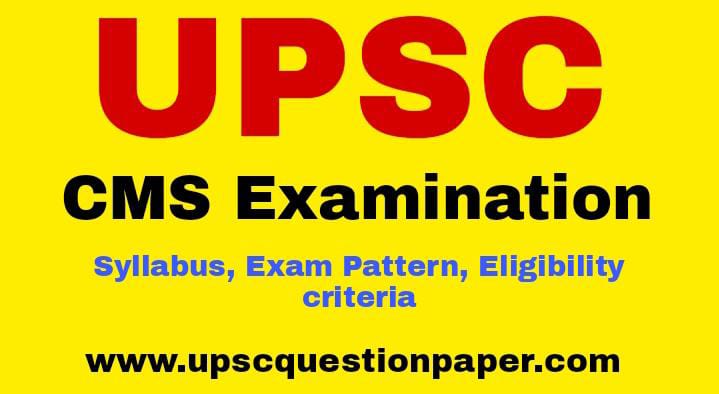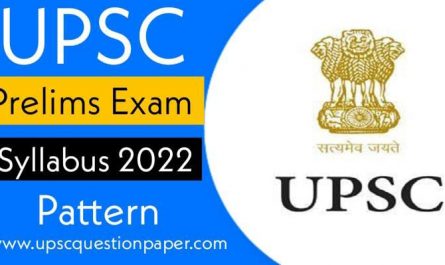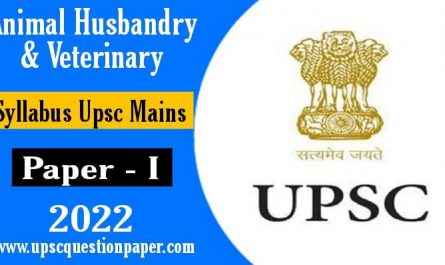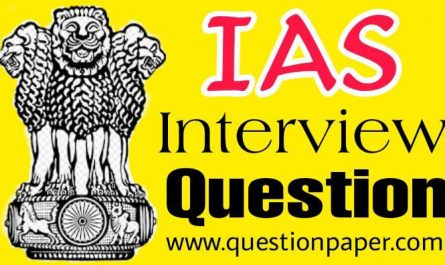Table of Contents
UPSC CMS Exam
UPSC Central Government के विभिन्न संगठनों और सेवाओं में Medical Graduates की भर्ती के लिए हर साल Combined Medical Services Examination (CMSE) आयोजित करता है। संयुक्त चिकित्सा सेवा परीक्षा (सीएमएसई) भारत के राजपत्र में स्वास्थ्य और परिवार कल्याण मंत्रालय द्वारा प्रकाशित नियमों के अनुसार आयोजित की जाती है।
यूपीएससी संयुक्त चिकित्सा सेवा परीक्षा / UPSC Combined Medical Services Examination (CMSE) हर साल, UPSC Medical Officer पदों के लिए उम्मीदवारों को शॉर्टलिस्ट करने के लिए संयुक्त चिकित्सा सेवा परीक्षा (सीएमएसई) आयोजित करता है। औसतन, तीन लाख से अधिक उम्मीदवार परीक्षा के लिए पंजीकरण करते हैं। उम्मीदवारों का चयन एक ऑनलाइन लिखित परीक्षा के माध्यम से किया जाएगा, जिसमें दो पेपर होते हैं। प्रत्येक पेपर दो घंटे की अवधि का होगा जिसमें अधिकतम 250 अंक होंगे।
UPSC CMS Examination Syllabus
The exam syllabus for Part-1 examination is given in the table below:
|
Paper-1: General Medicine & Pediatrics |
A) General Medicine: . |
(i) Cardiology (ii) Respiratory diseases (iii) Gastro-intestinal (iv) Genito-Urinary (v) Neurology (vi) Hematology (vii) Endocrinology (viii) Metabolic disorders (ix) Infections/Communicable Diseases a) Virus b) Rickets c) Bacterial d) Spirochetal e) Protozoan f) Metazoan g) Fungus (x) Nutrition/Growth (xi) Diseases of the skin (Dermatology) (xii) Musculoskeletal System (xiii) Psychiatry (xiv) General (xv) Emergency Medicine (xvi) Common Poisoning (xvii) Snakebite (xviii) Tropical Medicine (xix) Critical Care Medicine (xx) Emphasis on medical procedures (xxi) Patho physiological basis of diseases (xxii) Vaccines preventable diseases and Nonvaccines preventable diseases (xxiii) Vitamin deficiency diseases (xxiv) In psychiatry include – Depression, psychosis, anxiety, bipolar diseases, and Schizophrenia. |
|
B) Pediatrics including the following |
(i) Common childhood emergencies, (ii) Basic newborn care, (iii) Normal developmental milestones, (iv) Accidents and poisonings in children, (v) Birth defects and counseling including autism, (vi) Immunization in children, (vii) Recognizing children with special needs and management, and (viii) National programs related to child health. |
|
|
Paper-2: Surgery, Gynaecology & Obstetrics, and Preventive & Social Medicine |
Surgery |
(Surgery including ENT, Ophthalmology, Traumatology and Orthopaedics) (I) General Surgery i) Wounds ii) Infections iii) Tumours iv) Lymphatic v) Blood vessels vi) Cysts/sinuses vii) Head and neck viii) Breast ix) Alimentary tract a) Oesophagus b) Stomach c) Intestines d) Anus e) Developmental x) Liver, Bile, Pancreas xi) Spleen xii) Peritoneum xiii) Abdominal wall xiv) Abdominal injuries (II) Urological Surgery (III) Neuro Surgery (IV) Otorhinolaryngology E.N.T. (V) Thoracic surgery (VI) Orthopedic surgery (VII) Ophthalmology (VIII) Anesthesiology (IX) Traumatology (X) Diagnosis and management of common surgical ailments (XI) Pre-operative and post operative care of surgical patients (XII) Medicolegal and ethical issues of surgery (XIII) Wound healing (XIV) Fluid and electrolyte management in surgery (XV) Shock pathophysiology and management. (b) GYNAECOLOGY & OBSTETRICS (I) OBSTETRICS i) Ante-natal conditions ii) Intra-natal conditions iii) Post-natal conditions iv) Management of normal labours or complicated labour |
|
Gynaecology & Obstetrics |
i) Questions on applied anatomy ii) Questions on applied physiology of menstruation and fertilization iii) Questions on infections in the genital tract iv) Questions on neoplasm in the genital tract v) Questions on the displacement of the uterus vi) Normal delivery and safe delivery practices vii) High-risk pregnancy and management viii) Abortions ix) Intra-Uterine growth retardation x) Medicolegal examination in obgy and Gynae including Rape. (III) FAMILY PLANNING i) Conventional contraceptives ii) U.D. and oral pills iii) The operative procedure, sterilization, and organization of programs in the urban and rural surroundings iv) Medical Termination of Pregnancy |
|
|
Preventive & Social Medicine |
I Social and Community Medicine II Concept of Health, Disease and Preventive Medicine III Health Administration and Planning IV General Epidemiology V Demography and Health Statistics VI Communicable Diseases VII Environmental Health VIII Nutrition and Health IX Non-communicable diseases X Occupational Health XI Genetics and Health XII International Health XIII Medical Sociology and Health Education XIV Maternal and Child Health XV National Programmes XVI Management of common health problems XVII Ability to monitor national health programs XVIII Knowledge of maternal and child wellness XIX Ability to recognize, investigate, report, plan and manage community health problems including malnutrition and emergencies. |
UPSC CMS Exam Pattern
UPSC CMS परीक्षा दो Steps में आयोजित की जाती है,
- Part -1
- Part -2
UPSC CMS Part-1 – एक कंप्यूटर आधारित Online Exam है जिसमें 250-250 अंकों के दो पेपर होते हैं। Part -1 के लिए Qualification प्राप्त करने वाले उम्मीदवारों को Part -2 के लिए बुलाया जाता है जो Personality Test or Interview का दौर होता है। Interview 100 अंकों का होता है।
UPSC CMS Part 1 – Computer-Based Online Exam
|
Paper |
Marks |
Subject |
Number of Questions |
Type of exam |
|
Paper-1 |
250 |
General Medicine and Paediatrics |
120 ( 96 from general medicine and 24 from pediatrics) |
Objective-type |
|
Paper-2 |
250 |
Surgery, Gynaecology & Obstetrics and Preventive & Social Medicine |
120 (40 from each part) |
Objective-type |
|
Total |
500 Marks |
UPSC CMS Part 2- Personality Test or Interview
UPSC CMS Part -2 एक Personality Test or Interview का दौर है जिसमें भाग -1 के बाद चुने गए उम्मीदवारों को INTERVIEW के लिए बुलाया जाता है। साक्षात्कार 100 अंकों का होता है। अंतिम कटऑफ 600 अंकों में से घोषित किया गया है।
UPSC CMS 2021 Eligibility Criteria
UPSC CMS में शैक्षिक योग्यता, आयु सीमा, चिकित्सा फिटनेस सहित विभिन्न मापदंडों पर पात्रता मानदंड का उल्लेख है जो नीचे दी गई तालिका में है:-
|
Educational Qualification |
MBBS कर चुके उम्मीदवार इस पद के लिए आवेदन कर सकते हैं। अंतिम वर्ष के छात्र भी इन पदों के लिए आवेदन करने के पात्र हैं। |
|
Age Limit |
32 साल से कम उम्र के उम्मीदवार इस परीक्षा के लिए आवेदन कर सकते हैं। हालांकि, जूनियर स्केल पद के लिए, ऊपरी आयु सीमा 35 वर्ष से अधिक नहीं होनी चाहिए। |
|
Medical Fitness |
उम्मीदवारों को परीक्षा के नियमों के परिशिष्ट III में नियमों के अनुसार संयुक्त चिकित्सा सेवा परीक्षा 2021 के लिए शारीरिक / चिकित्सा मानकों के अनुसार शारीरिक और चिकित्सकीय रूप से फिट होना चाहिए। |
Read More…
दोस्तों हमने आपको UPSC CMSE Syllabus, Exam Pattern के बारे में संपूर्ण जानकारी दी है और आपको बताया है आशा करते हैं कि आप इस आर्टिकल को समझ गए होंगे और हमारे द्वारा दी हुई जानकारी आपको पसंद आई होगी तो आशा करते हैं कि आप हमारे इस आर्टिकल को ज्यादा ज्यादा शेयर करेंगे तो मिलते हैं अगले आर्टिकल में तब तक के लिए जय हिंद वंदे मातरम




One thought on “What Is UPSC CMS Exam?, Syllabus, Exam Pattern”